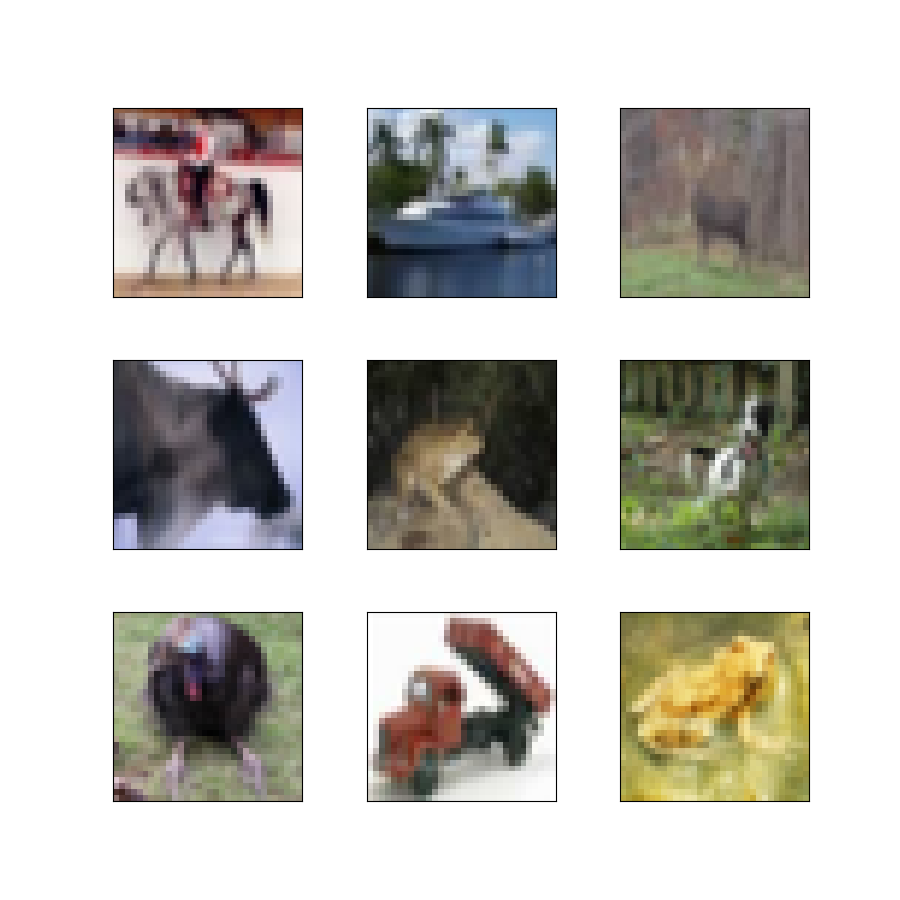- Description:
A re-labeled version of CIFAR-10 with real human annotation errors. For every pair (image, label) in the original CIFAR-10 train set, it provides several additional labels given by real human annotators.
Source code:
tfds.image_classification.cifar10_n.Cifar10NVersions:
1.0.0: Initial release.1.0.1: Fixed typo inworse_labelkey.1.0.2: Fixed correspondence between annotations and images.1.0.3: Fixed files inMANUAL_DIR.1.0.4(default): Fixed loading of side information.
Download size:
162.17 MiBDataset size:
147.91 MiBManual download instructions: This dataset requires you to download the source data manually into
download_config.manual_dir(defaults to~/tensorflow_datasets/downloads/manual/):
Download 'side_info_cifar10N.csv', 'CIFAR-10_human_ordered.npy' and 'image_order_c10.npy' from https://github.com/UCSC-REAL/cifar-10-100n
Then convert 'CIFAR-10_human_ordered.npy' into a CSV file 'CIFAR-10_human_annotations.csv'. This can be done with the following code:
import numpy as np
from tensorflow_datasets.core.utils.lazy_imports_utils import pandas as pd
from tensorflow_datasets.core.utils.lazy_imports_utils import tensorflow as tf
human_labels_np_path = '<local_path>/CIFAR-10_human_ordered.npy'
human_labels_csv_path = '<local_path>/CIFAR-10_human_annotations.csv'
with tf.io.gfile.GFile(human_labels_np_path, "rb") as f:
human_annotations = np.load(f, allow_pickle=True)
df = pd.DataFrame(human_annotations[()])
with tf.io.gfile.GFile(human_labels_csv_path, "w") as f:
df.to_csv(f, index=False)
Auto-cached (documentation): Yes
Splits:
| Split | Examples |
|---|---|
'test' |
10,000 |
'train' |
50,000 |
- Feature structure:
FeaturesDict({
'aggre_label': ClassLabel(shape=(), dtype=int64, num_classes=10),
'id': Text(shape=(), dtype=string),
'image': Image(shape=(32, 32, 3), dtype=uint8),
'label': ClassLabel(shape=(), dtype=int64, num_classes=10),
'random_label1': ClassLabel(shape=(), dtype=int64, num_classes=10),
'random_label2': ClassLabel(shape=(), dtype=int64, num_classes=10),
'random_label3': ClassLabel(shape=(), dtype=int64, num_classes=10),
'worker1_id': int64,
'worker1_time': float32,
'worker2_id': int64,
'worker2_time': float32,
'worker3_id': int64,
'worker3_time': float32,
'worse_label': ClassLabel(shape=(), dtype=int64, num_classes=10),
})
- Feature documentation:
| Feature | Class | Shape | Dtype | Description |
|---|---|---|---|---|
| FeaturesDict | ||||
| aggre_label | ClassLabel | int64 | ||
| id | Text | string | ||
| image | Image | (32, 32, 3) | uint8 | |
| label | ClassLabel | int64 | ||
| random_label1 | ClassLabel | int64 | ||
| random_label2 | ClassLabel | int64 | ||
| random_label3 | ClassLabel | int64 | ||
| worker1_id | Tensor | int64 | ||
| worker1_time | Tensor | float32 | ||
| worker2_id | Tensor | int64 | ||
| worker2_time | Tensor | float32 | ||
| worker3_id | Tensor | int64 | ||
| worker3_time | Tensor | float32 | ||
| worse_label | ClassLabel | int64 |
Supervised keys (See
as_superviseddoc):NoneFigure (tfds.show_examples):

- Examples (tfds.as_dataframe):
- Citation:
@inproceedings{wei2022learning,
title={Learning with Noisy Labels Revisited: A Study Using Real-World Human
Annotations},
author={Jiaheng Wei and Zhaowei Zhu and Hao Cheng and Tongliang Liu and Gang
Niu and Yang Liu},
booktitle={International Conference on Learning Representations},
year={2022},
url={https://openreview.net/forum?id=TBWA6PLJZQm}
}
